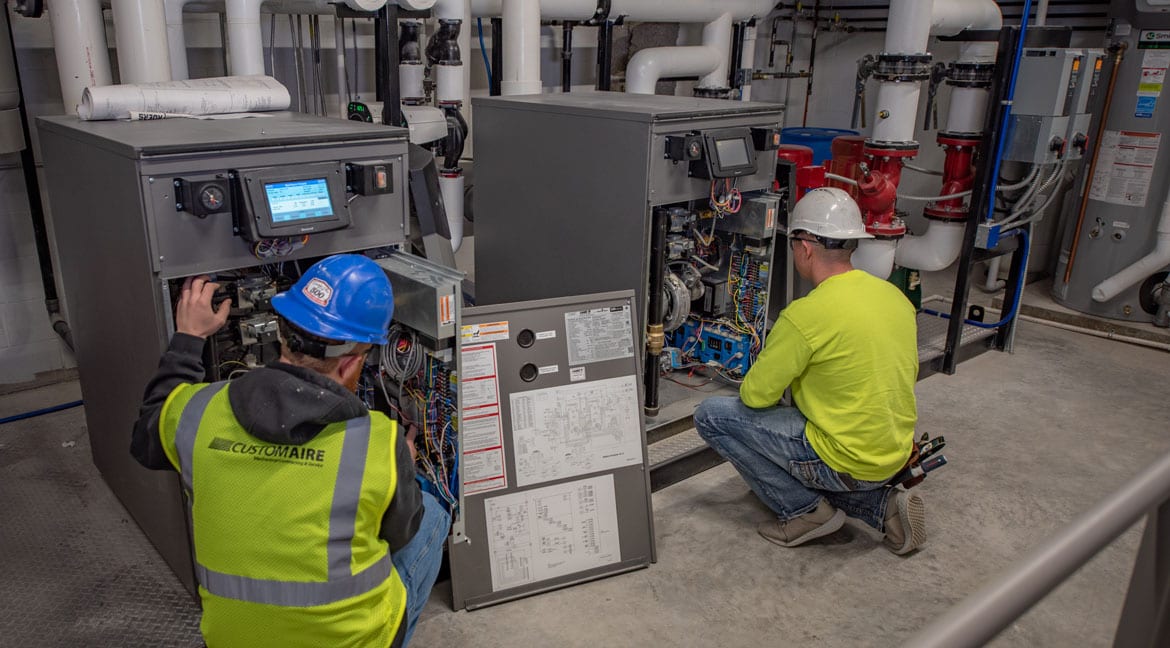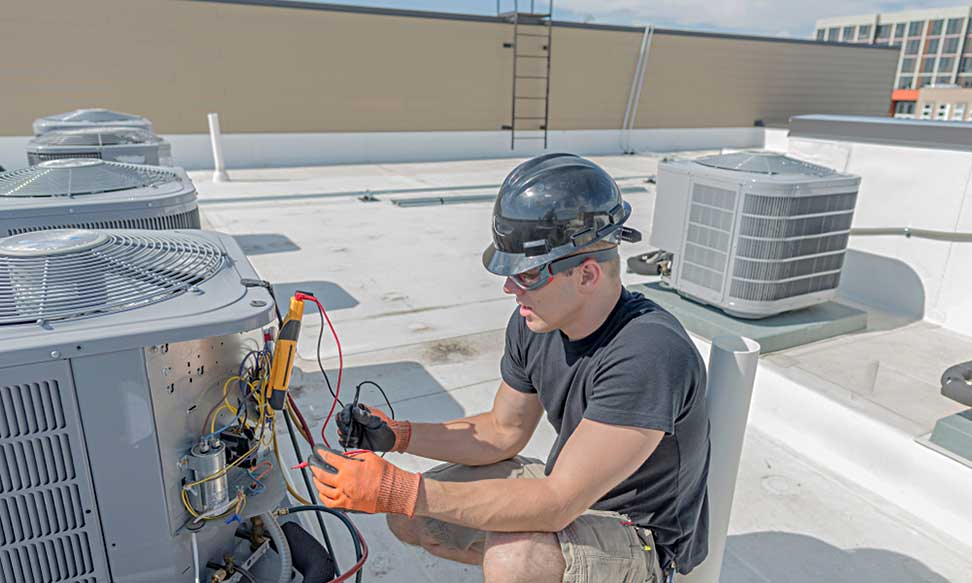Selecting Between a Heatpump and Heating System: Key Factors To Consider for Your Heating And Cooling Needs
When assessing home heating alternatives for a/c needs, the choice between a heat pump and a heating system can be intricate. Each system provides distinct advantages tailored to particular climates and energy performance objectives. Understanding these differences is crucial for making an enlightened choice. Trick aspects such as installation expenses and ecological effect further complicate the choice procedure. Which option genuinely lines up with one's comfort and sustainability choices? The complying with sections will discover these factors to consider in detail.
Understanding Warm Pumps: Just How They Function and Their Benefits
While numerous house owners think about numerous home heating alternatives, recognizing exactly how heat pumps feature and their benefits can substantially influence their decision. Warmth pumps operate by moving heat as opposed to creating it. In the wintertime, they remove warmth from the outside air or ground and move it inside, while in the summer season, they reverse this process, cooling down the home by removing warmth outside. This twin capability makes them flexible for year-round environment control.One of the main advantages of warmth pumps is their energy efficiency. They make use of significantly much less power compared to traditional heating unit, potentially causing reduced energy bills (heat pump service). Additionally, heatpump have a smaller sized carbon footprint, making them an eco-friendly option. They also call for less upkeep than standard systems, adding to lasting cost savings. In general, recognizing the technicians and advantages of heatpump can assist house owners make notified choices concerning their heating and cooling down needs
Discovering Heaters: Kinds, Operation, and Benefits
Heating systems are available in numerous types, consisting of gas, electrical, and oil versions, each with distinct operational devices. Comprehending these differences is vital, as they influence performance and heating efficiency. Furthermore, heaters offer various benefits, such as constant warm outcome and integrity in chillier climates.
Kinds of Heaters
Furnace can vary significantly in style and procedure, with furnaces being a prominent selection among home owners. There are numerous sorts of furnaces, each utilizing different fuel sources and modern technologies. Gas heaters are typical, leveraging natural gas to create warm efficiently. Electric heating systems, on the other hand, use electrical resistance to create warmth, commonly preferred for their uncomplicated setup. Oil heating systems, while less common, work in locations with limited gas gain access to (heat pump installation ooltewah tn). Furthermore, condensing furnaces optimize energy effectiveness by capturing and reusing exhaust gases. Each kind runs via a system of warm exchangers and ductwork to distribute warm air throughout a home. Comprehending the distinctions in between these furnace types is necessary for notified cooling and heating choices
Benefits of Heating systems
For house owners looking for reliable heat throughout cold months, the benefits of heating systems are significant. Heating systems supply constant home heating, guaranteeing also temperature levels throughout the home. They are especially effective in extreme cold, commonly exceeding heatpump in cold problems. Numerous kinds, consisting of gas, electrical, and oil heating systems, use flexibility to meet diverse demands and preferences.Furnaces additionally tend to have reduced preliminary installation prices compared to warm pumps, making them an extra easily accessible choice for many. Their durable layout adds to a longer life expectancy, with lots of systems lasting over 15 years with correct maintenance. Additionally, contemporary heaters are usually geared up with innovative modern technology for boosted efficiency, which can cause minimized power expenses. Overall, furnaces remain a trustworthy selection for effective home heating.

Energy Effectiveness: Contrasting Heat Pumps and Furnaces
When comparing energy efficiency in between heatpump and heating systems, the Seasonal Energy Efficiency Proportion (SEER) plays a necessary function in determining performance. Additionally, an operational price evaluation exposes the long-term economic implications of each system. Understanding these variables can guide property owners in making notified choices regarding their heating services.
Seasonal Power Efficiency Ratio
Power performance plays an important function in the decision-making process between warmth pumps and heating systems, particularly when taking into consideration the Seasonal Energy Efficiency Ratio (SEER) This statistics steps the cooling performance of heatpump over an entire air conditioning season, supplying a standard way to assess efficiency. Higher SEER rankings show better power effectiveness, converting to reduced energy usage and reduced energy costs. On the other hand, heaters are normally evaluated making use of the Yearly Fuel Use Performance (AFUE) rating, which mirrors heating effectiveness. When contrasting these two systems, homeowners need to focus on SEER rankings for heat pumps, as they straight effect overall power cost savings and ecological sustainability. An extensive understanding of SEER can significantly influence the lasting contentment and cost-effectiveness of the picked HVAC solution.
Operational Cost Analysis
Understanding the functional costs related to warmth pumps and heaters is crucial for house owners examining their options. Heatpump normally supply greater power efficiency, converting electric power into warmth with minimal waste. This causes reduced month-to-month utility expenses, especially in moderate climates. Conversely, traditional furnaces, especially gas designs, may have lower ahead of time costs yet can sustain greater functional costs over time as a result of sustain prices and efficiency ratings.Moreover, heat pumps can operate as both heating and cooling down systems, potentially reducing the need for different heating and cooling systems. While preliminary financial investments for warm pumps may be greater, their long-term cost savings in power efficiency can make them a much more cost-effective selection for many homes. Mindful evaluation of local energy prices is important to establish the best choice.
Installment Expenses: What to Anticipate for every Heater
Setup prices for heating unit can vary substantially in between warm pumps and heaters, affecting property owners' choices. Heat pumps usually have greater upfront installment prices, normally varying from $3,500 to $8,000, depending on the unit dimension and intricacy of setup. This includes the outside device, indoor handling system, and required ductwork modifications. On the other hand, heaters often tend to have reduced initial costs, averaging in between $2,500 and $6,000, which can be appealing for budget-conscious house owners. Installment costs can raise if considerable ductwork is required.Moreover, the selection of gas type for furnaces-- natural gas, gas, or electrical-- can likewise affect installation prices. While warm pumps offer power performance, their preliminary financial investment might prevent some customers. Eventually, reviewing installment costs along with long-term cost savings and effectiveness will help home owners in making informed decisions regarding their heater.
Climate Factors To Consider: Which System Performs Better in Your Area
Just how do climate conditions influence the efficiency of furnace? The performance of heatpump and furnaces can vary substantially depending on the neighborhood environment. In modest climates, warmth pumps excel by efficiently transferring warmth from the outside air, making them an energy-saving choice. Their efficiency decreases in very cold temperatures, where they might have a hard time to draw out sufficient warmth. Conversely, furnaces, especially gas designs, offer dependable and constant warm despite outside conditions, making them more effective in cooler regions.In areas that experience milder winters months, heatpump can operate properly year-round, providing both heating & cooling. In contrast, areas with harsh winter seasons usually take advantage of the toughness of heating systems. Inevitably, understanding the regional climate is vital when deciding between a heatpump and a furnace, as it straight impacts their operational efficiency and total performance.
Maintenance Needs: Long-Term Take Care Of Warm Pumps vs. Furnaces
While both warmth pumps and heating systems call for normal maintenance to assure peak performance, their specific requirements and treatment regimens vary substantially. Heating systems normally require less frequent focus, with yearly assessments being enough to look for gas leakages, clean filters, and examine total functionality. Their less complex design commonly enables for simple repairs.In comparison, heat pumps necessitate semiannual maintenance due to their dual role in cooling and heating. This consists of cleansing coils, checking refrigerant degrees, and making certain that both the outside and indoor systems function at their best. In addition, heatpump maintenance commonly entails even more detailed parts, making specialist servicing essential.Neglecting upkeep can result in reduced performance and increased power costs for both systems. Eventually, house owners should consider these lasting treatment demands when selecting between a heatpump and a furnace, as proactive maintenance can prolong the life-span and efficiency click here to read of either system considerably.
Environmental Impact: Picking a Lasting Heating Option
The environmental effect of furnace is an essential analysis for property owners seeking lasting options. Warm pumps are generally much more our website energy-efficient than standard furnaces, as they transfer heat instead of produce it, greatly minimizing carbon emissions. By making use of renewable power resources, such as air-source or geothermal heatpump, house owners can additionally minimize their environmental footprint.On the other hand, all-natural gas heating systems release greenhouse gases and add to air pollution, though they frequently provide greater warm result. Improvements in modern technology have actually led to the development of high-efficiency heating systems that minimize emissions.Ultimately, choosing a home heating system entails considering performance against environmental influence. Property owners are urged to mirror on local power resources and incentives for renewable systems, making certain a choice that aligns with both individual convenience and environmental responsibility. The decision affects not just immediate comfort yet additionally long-lasting sustainability and ecological wellness.
Frequently Asked Concerns
For How Long Do Warmth Pumps and Furnaces Commonly Last?
The life-span of heatpump typically ranges from 15 to 20 years, while heating systems can last between 15 to three decades. Regular upkeep significantly impacts their durability and effectiveness in supplying heating services.
Can I Use a Heat Pump in Very Cold Climates?
Heat pumps can operate in very cold environments, however their efficiency lessens as temperatures drop. In such problems, extra home heating sources may be necessary to keep comfy indoor temperatures and ensure peak performance.

What Is the Sound Level of Warm Pumps Versus Furnaces?
The noise degrees of heatpump and heaters differ considerably. Generally, warm pumps run even more silently than standard heaters, making them preferable for those conscious seem, while heaters might generate louder operational noises throughout home heating cycles.
Are Warmth Pumps Suitable for Both Cooling And Heating?
Warm pumps are without a doubt content appropriate for both heating and air conditioning (ductless mini splits). They function by moving warm, offering effective temperature control year-round, making them a flexible choice for homeowners looking for an all-in-one heating and cooling remedy
What Size Heating Unit Do I Need for My Home?
Identifying the ideal dimension heating system for a home requires examining variables such as square video footage, insulation quality, local climate, and the home's design. Consulting an expert can assure a precise assessment and ideal comfort. Heat pumps normally supply higher energy effectiveness, converting electrical power right into warm with very little waste. In moderate environments, warm pumps succeed by successfully moving warmth from the outside air, making them an energy-saving alternative. On the other hand, heating systems, particularly gas designs, provide consistent and trustworthy warmth no matter of exterior conditions, making them more effective in cooler regions.In areas that experience milder winter seasons, warmth pumps can operate efficiently year-round, offering both heating and air conditioning. Warmth pumps are typically extra energy-efficient than typical furnaces, as they move heat instead than produce it, substantially minimizing carbon exhausts. By using renewable power sources, such as geothermal or air-source heat pumps, property owners can better minimize their ecological footprint.On the various other hand, natural gas heaters discharge greenhouse gases and add to air pollution, though they usually provide higher warm result.